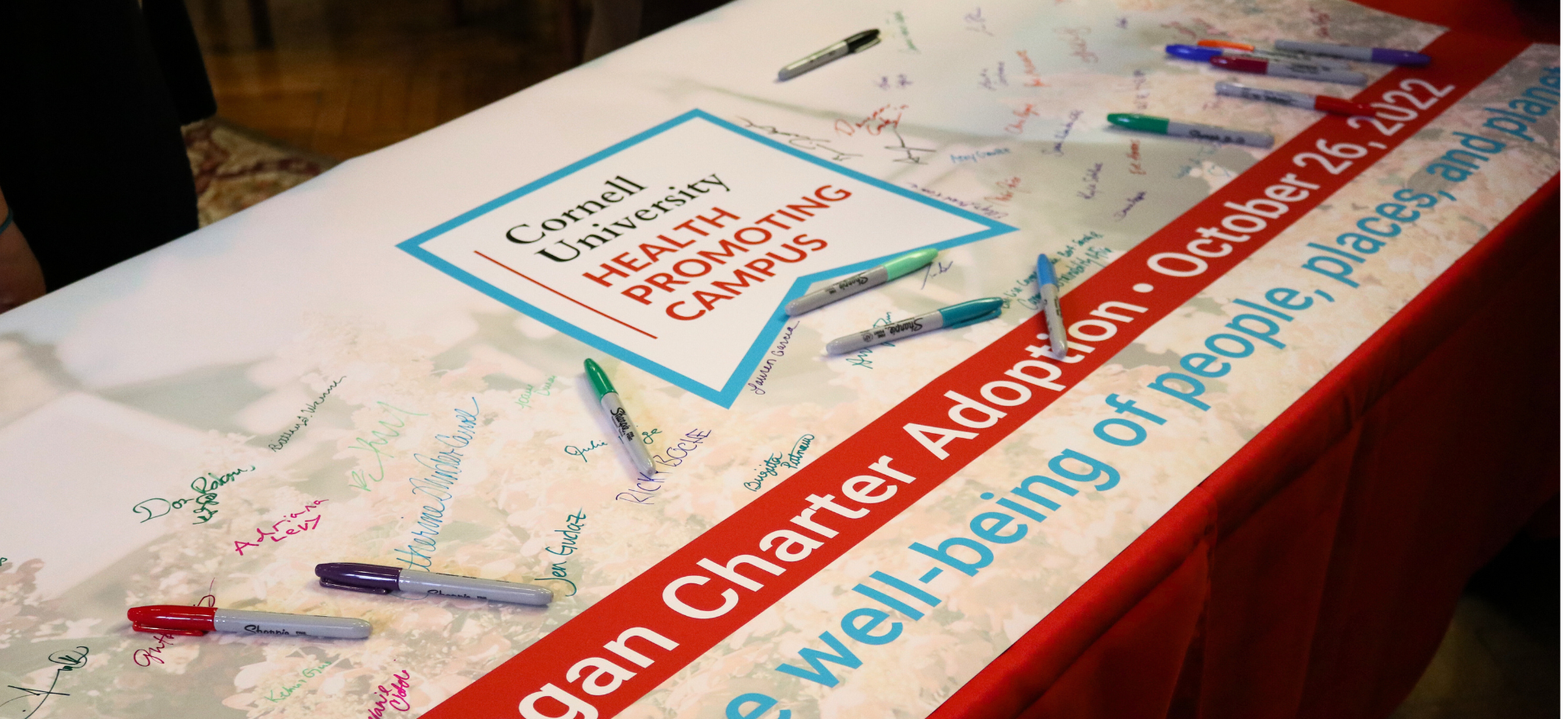About

Cornell's journey...
In October of 2022, Cornell University formally adopted the international Okanagan Charter to become a Health Promoting Campus. Adopting the charter allows us – and over 200 Institutions of Higher Education (IHE) – to advance existing institutional priorities in a systemic, sustainable way, both on campus and beyond.
Our work as a Health Promoting Campus is designed to transform the health and sustainability of our current and future societies, strengthen communities, and contribute to the wellbeing of people, places, and the planet.
Cornell has long-recognized that promoting the health and wellbeing of all students, staff, and faculty is foundational for academic, work, and life success. Examples of this commitment include:
- Cornell's student Mental Health Framework, a comprehensive and integrated public health approach that reflects best practices to suicide prevention and mental health promotion
- Our student Mental Health Review, a comprehensive review of Cornell’s campus climate identifying over 130 recommendations to support student mental health and wellbeing.
- The university priority for Employee Wellbeing which spans seven different facets of wellbeing.
In addition, our institutional commitment to sustainability and climate change research, teaching, and engagement directly impacts the wellbeing of our university and of the planet. Our campuses are living laboratories for developing, testing and implementing solutions that address these most challenging issues.
Our commitments to people, places, and planet closely align with the guiding principles of the international Okanagan Charter.
What is the Okanagan Charter?
The international Okanagan Charter is a guiding and aspirational document that was developed as an outcome of the 2015 International Conference on Health-Promoting Universities and Colleges.
Health promotion scholars, researchers, practitioners, and administrators from 45 countries created this document with the purpose to guide colleges and universities, using their unique positions and roles in research, teaching, and service to their communities, to be leaders for the world in developing and modeling health-promoting strategies in their campus settings.
Local communities can learn from this example and modeling, thus influencing global health and wellbeing strategy. The key is moving beyond traditional approaches focused on individual behavior to upstream, systems-level, environmental strategies that influence the health and wellbeing of person, place, and planet.
Calls to action
- Embed health into all aspects of Cornell culture, across the administration, operations and academic mandates
- Lead health promotion action and collaboration locally and globally
Guiding principles
Benefits of becoming a health-promoting campus
Adopting the Okanagan Charter to become a health-promoting campus has many benefits:
- Demonstrate leadership: Formal adoption of the Okanagan Charter by senior leadership reaffirms Cornell’s commitment to furthering health, wellbeing, and sustainability and sends a powerful signal to the broader community.
- Engage our community: The Okanagan Charter generates dialogue and research to inform health and wellbeing initiatives at Cornell and in the broader community.
- Support the wellbeing of our community: Guide and inspire action to help faculty, staff, and students achieve their full potential in teaching, learning, research, and engagement. Evidence shows that people who are well are more productive, better able to engage in deeper learning, have a greater sense of belonging, and a stronger sense of community.
Health Promoting Campus Glossary of Terms
| Term | Definition |
|---|---|
| Health Promotion | The process of enabling people to increase control over, and to improve, their health. It moves beyond a focus on individual behavior towards a wide range of social and environmental interventions. (WHO 1998) |
| Health | A state of complete physical, mental, and social well-being and not merely the absence of disease or infirmity. (WHO 1946) |
| Wellness | A multidimensional, individually-experienced subjective state that allows the development of the whole person. Dimensions can include, but are not limited to, emotional, environmental, intellectual, social, physical, occupational, and personal. |
| Wellbeing | A positive physical, mental, spiritual, and social state experienced by individuals, communities, and societies. It is a sociopolitical choice that is everchanging due to the social norms, policies, institutions, economies, and ecosystems with which people interact. |
| Belonging | The feeling of security and support when an individual experiences acceptance and inclusion for who they are at their most authentic self. (modified from Belonging at Cornell) |
| Supportive Environments | An environment that is open, engaging, and challenging, fostering holistic growth and enabling individuals to flourish. |
| Flourish(ing) | A framework for understanding human wellbeing across five domains: (i) happiness and life satisfaction; (ii) health, both mental and physical; (iii) meaning and purpose; (iv) character and virtue; and (v) close social relationships. (VanderWeele 2017) |
| Meaningful Connection | A key component of belonging in which an individual feels understood during socially and emotionally engaging interactions with others through similarity or across difference. |
| Systems-Level Approach | Recognizing that our communities and societies are highly complex and interdependent, multidisciplinary thinking involving individuals, groups, and communities are needed. |
| Holistic | Dealing with or treating the whole of something or someone and not just a part. |
Questions
Email healthpromotingcampus@cornell.edu to ask a question.
